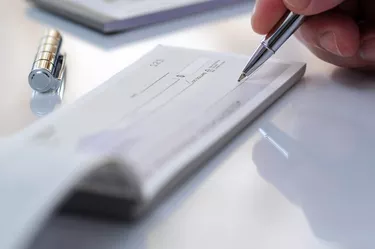
Accepting checks as payment is something people do on a regular basis. There are still employers that pay their employees with a check instead of direct deposit. If you own a business, there will be customers who prefer to write a check than hand over cash or use a credit card. Although checks are still an acceptable form of payment, the chance exists that you will eventually encounter a fraudulent check. You can decrease your chances if you put some safeguards in place. And if you receive a fraudulent check, there are ways to lessen the damage the check can cause your bank account.
What Is a Fraudulent Check?
Video of the Day
A check that is dishonored by the bank where it is presented is a fraudulent check. These checks can take several forms, from being returned for insufficient funds to a check written off a non-existent account. Many times, a check isn't recognized as fraudulent until the receiving bank tries to get payment and the bank the check is written from refuses to pay it. This is called check fraud and can have serious consequences for all parties involved.
Video of the Day
Depositing a Fake Check Consequences
For most people, the first sign that a check that they cashed is fraudulent is when the bank deducts the amount from their checking account. In many cases, the check overdraws the bank account and results in one or more fees. The bank might also contact the account holder and inform them that a fraudulent check went through their account.
Warning Signs of a Fraudulent Check
One sign that a check might be fraudulent is its origin. For example, fraudulent work-at-home opportunities can result in check fraud. There might be an advertisement from someone who is looking for a person to deposit money into their bank account. In return, the person can keep a percentage of the check, but distribute the rest to other accounts usually through a wire service such as Western Union. In many cases, the initial check that was deposited is a fraudulent check. However, this is normally not discovered until after you have used the funds to distribute to the other accounts as requested. Depositing a fake check's consequences can include the accusation of check fraud, which is a serious charge.
Someone Pays With a Fraudulent Check
In other cases, the check could come from what's considered a reliable source but, for whatever reason, gets returned for non-sufficient funds. This could be a check from a friend or someone who purchased items from you. Whatever the circumstances may be, the resulting hit to your bank account is still an issue that you have to investigate and try to rectify.
How To Avoid Fraudulent Checks
Although there is no way to completely prevent receiving a fraudulent check, there are things you can do to lessen the chances of this occurring. First, do not accept checks from people you do not know and trust. If you're a business, only accept cashier's checks, money orders or credit cards. Cashier's checks and money orders can only be purchased with verifiable funds such as cash. A transaction with a credit or debit card will not go through if the funds are not available in the account.
The Bank May Help
If you were paid with a fraudulent check, your bank might refund the fees and not hold you responsible for the debt. However, they will expect you to provide them with all of the information you have about the person or business that presented the fraudulent check to you. The more information you can provide, the better the chances that you will not be on the hook for the missing funds. But be prepared to be held responsible just in case.
Cashing a fraudulent check is something that could happen to anyone. But a good rule of thumb is if the opportunity seems too good to be true or the process for a payday seems too easy, then it should probably be avoided.